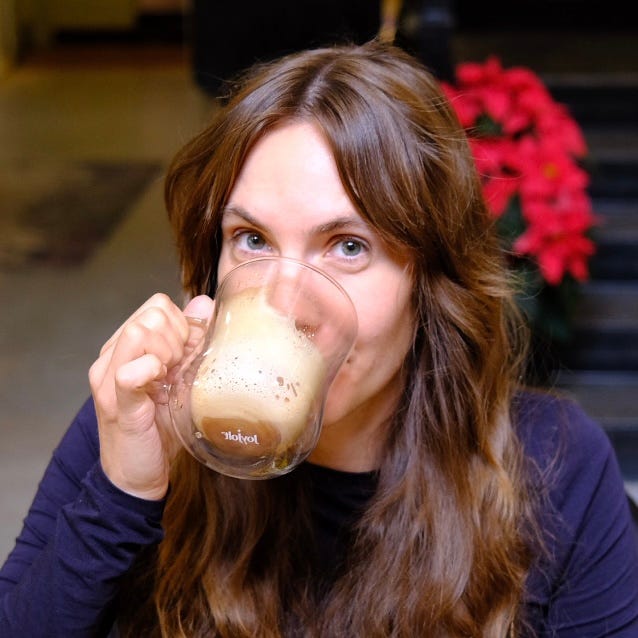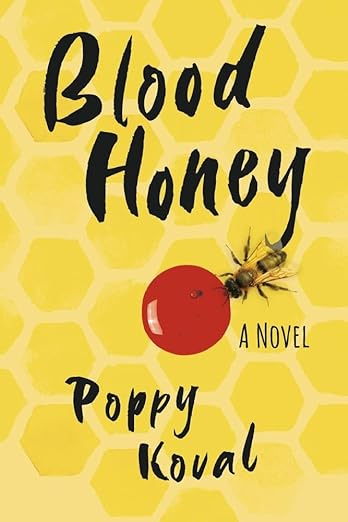Welcome to Indie Author Spotlight where I interview talented writers I’ve met online who have valuable insights to share on their writing process, publication, and what it means to be an indie author.
Brooklyn author Poppy Koval writes quirky, character-driven fiction that explores themes of social & economic class, dating mishaps, friendship, and empathy. Her short stories have been published in various literary journals. Blood Honey is her debut novel.
Poppy's absolute favorite topics to write about are food crimes, narcissists, and people pleasers.
How did you initially get into fiction writing?
It's a bit of a cliche, but I had recently gotten out of a bad relationship that had taken up a lot of my free time. I wanted to get back into making art, which is what I had done before the relationship (which lasted almost a decade). My previous hobby of making online comics didn't seem to suit me anymore. Taking on novel writing was daunting, but for some reason I started there instead of short stories. I struggled at first but found an amazing writing coach just a short walk from where I lived in NYC; her guidance helped me finish my first novel. (It became a "drawer novel," never to be published, but that's how these things go.)
I loved Blood Honey! How did these ideas of bees, a failing cherry factory owner, a New York hasn’t-quite-made-it journalist, and a Chinese food gangster come together?
Thank you so much! The initial motivation was that I wanted to combine my love of gossipy relationship drama with my love of 80s/90s action movies (in all their formulaic glory). I love reading about deep characters, but also I like a book with a plot, so that's what I set out to create. I kept bees for a few years at a tiny farm in upstate NY. Shortly after my time as a beekeeper ended, I was super hungover in Manhattan one morning and got sick into a trashcan on the street. The trashcan was full of honeybees gathering "nectar" from old Starbucks cups and now my regurgitated coconut water. I was a few blocks from the Union Square Farmers Market, where some vendors sell local honey from NYC rooftop bees for super high prices. A thought started to form about what kinds of other things might end up in honey. I read about several real news cases of honey turning strange colors because of what the bees were eating. I also researched a lot about counterfeit foods and food crimes - smuggled maple syrup in Canada, avocado cartels in Mexico, fake versions of rare Twix flavours. It was so odd that something that seems funny on the surface (food crime!) actually involves real danger and jail time for the criminals involved. There were some cases of people dying from drinking counterfeit milk or eating rice that was actually made of plastic.
Did you draw inspiration for these characters from people you know?
For some of them I did - there are little snippets of conversation I've heard over the years with various friends, coworkers, or exes that I feel really encapsulate a whole personality and can be used as the kernel for building a fictional character. The thing Marlow says about people wanting to worship or tame her, or else be terrified by her, was inspired by something a friend said way back in college. As a whole you wouldn't recognize Marlow as my wild and confident college friend (they are very different), but she was the inspiration.
Your Instagram bio reads, “character-driven women’s fiction.” Do you consider this book to be “women’s fiction” and if so, what makes it that?
I actually didn't set out to write "women's fiction" - I just wanted to write about characters who had realistic personalities and deep emotions, and I wanted to explore how their bad behavior in relationships affected each other. Initially I was marketing Blood Honey as "funny crime fiction," but it wasn't reaching as wide an audience ("funny crime fiction" is a very niche category). So I started leaning into the "women's fiction" angle, since the book contains topics you would find in women's fiction -- a female protagonist struggling with her career, dating drama, etc. The men I've talked to about reading Blood Honey like it, so I do question the labels. Marketing a book is even harder than writing a book!
What’s your writing process? Do you start with characters? Plot ideas? How do you get started on a project?
I usually start out with a vague idea for what I want to "say." In this case I wanted to write about how the struggle for money we all seem to be going through takes a toll on our relationships and in some cases our personalities and morality. Then I figure out the characters -- they are all basically struggling with the same problems (careers, loneliness, money, relationships), but they each handle the problems differently. I usually start out with a few ideas for major plot points, but then I need to make an outline and timeline where I come up with additional plot points and sequence them together.
Tell us about your writing routine. Do you have any creative rituals or a favorite place to write?
I try to write every day, but it's a struggle. The thing that has helped me stay consistent over the years is being part of a writing group. We meet every two weeks, and each person reads every 5 weeks or so. So no matter how unmotivated I am, I am at the very least forced to write 10 pages every five weeks. Ideally I write a lot more, but it's good to have that accountability. I also love to write in coffee shops -- there's a time limit at a coffee shop (about 1-2 hours at most), so it really helps me focus up and not get distracted scrolling the internet.
What criticism have you received that has helped you grow as a writer?
When I first started out writing, I used to get feedback in my writing group that people didn't know why the characters were reacting the way they were. I had thought it was obvious - how else would they react in that situation? My initial solution was to start explaining during the scene what they were thinking. But that made the scenes stilted. It interrupted the flow of the dialogue.
The underlying problem was that I was under-writing my characters -- their fully formed personalities weren't making it on the page, so I had to explain what they were thinking every time they did or said something. That's the sign of a problem! Eventually I learned how to write characters that the reader knows well enough that they can follow along with their thinking without having it constantly explained to them.
What are some of your writing influences? Favorite books?
When I was younger I really loved Hemingway - he can capture emotion with so few words! Currently I'm into authors who write many words to capture emotions - people like Rachel Cusk, Rachel Yoder, Jana Casale, and Melissa Broder. Their novels are all more emotion than plot though, and do find myself yearning for plot. I think Kirstin Chen strikes a great balance of the two.
I discovered you on Instagram. What role does social media play in your marketing efforts?
I've made some great connections through social media - I've met wonderful people, had some good discussions about books (mine and others'), and read some wonderful authors I wouldn't have otherwise encountered (you included!). Although I think social media is important for marketing, and I have sold books through my marketing efforts there, most of my sales actually come from Amazon ads.
What’s your approach to marketing? What has worked or not worked for you?
So... my initial approach to marketing was terrible. I was very burnt out after querying Blood Honey and getting so close to finding an agent and ultimately being rejected. So I decided I would self publish as a way to just check it off the list. I did hardly any marketing before the book was released. My goal was to sell ten copies. I DO NOT RECOMMEND THIS APPROACH! The response to Blood Honey was encouraging, so I realized right away that I had sold myself short. I tried to play catch up as best I could. I recommend listening to the marketing advice online about building up an audience before you release, doing cover reveals, partnering with other authors, etc. It's frustrating to take time away from actual writing to figure out marketing, and it's frustrating to delay your release date to give yourself time for marketing, but it's really important.
Approaching legitimate Bookstagrammers to see if they wanted to review my book (or being approached by them) has helped sell some copies. Doing Instagram and FB ads sold a few copies but not many. Google ads also didn't seem to work that well. Amazon ads have worked the best for me - I look for books or authors whose readers I feel will also enjoy my work, and I place ads there. I got the most sales from my ads placed on Mad Honey, which is a book that involves beekeeping (like mine!) by an author who tackles ethical topics (like me!).
What are you working on now?
My current work-in-progress is about two deeply connected friends who may have outgrown each other.
When his best friend nearly dies in a psychedelic ceremony, a man infiltrates a cult-like yoga community to discredit them and win back her loyalty, only to nearly get seduced by the community himself. It's set at a scrappy maple syrup farm-turned-upscale yoga retreat center in Nova Scotia. (I can't seem to get away from having sweet, delicious foods as a backdrop...)
Where can readers find you?
I'm most active on Instagram! https://www.instagram.com/poppy.koval/ I try to post on threads occasionally as well.





